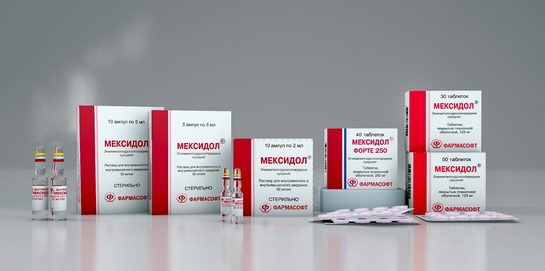The results of an international multicenter randomized double-blind-controlled study of the efficiency and safety of sequential therapy of patients with chronic brain ischemia drugs Mexidol ® and Mexidol ® Forte 250 (study of Memo) conducted in full accordance with the international ethical and scientific research standard and conducting research with the participation Man (GCP), published in the journal of neurology and psychiatry named after S.S. Korsakova, 2021; 121 (11): 7–16. https://doi.org/10.17116/jnevro20211211117 , leading the Higher Attestation Commission - a reviewed publication for neurologists and psychiatrists of Russia.
The study of Memo was attended by 318 patients with chronic cerebral ischemia (Khim) from 15 clinical centers of various regions of Russia and Uzbekistan. Patients of the 1st group received long-term sequential therapy with Mexidol according to the scheme: Mexidol ® at a dose of 500 mg per day intravenously 14 days, with the subsequent transition to the tablet form of Mexidol ® Fort 250, 1 tablet 250 mg three times a day against the background of basic therapy. Within 8 weeks. The second group of patients, together with basic therapy, received a placebo according to a similar scheme.
According to the resulting results of the study, long -term sequential therapy with Mexidol ® and Mexidol ® Forte 250 contributes to the reliable regression of the severity of such the most important manifestations of chemicals as cognitive, emotional, vegetative and motor disorders. The simultaneous significant regression of all the basic clinical manifestations of Khim is an important argument in favor of the fact that Mexidol therapy affects the pathogenetic foundations of chronic vascular lesion of the brain, not limited to symptomatic improvement.
So, in the Mexidol group, a reliable improvement and normalization of cognitive functions by the end of therapy (75th day): +4.22 points on the Mosa scale with a total score of 26.22-the norm (VS 2.17 points in the placebo group and the total score. 24,17 - cognitive disorders) and +8 points for the dialing test test (VS +5 points in the placebo group), which indicates the high efficiency of Mexidol in relation to the dominant symptom of chemical disorders - cognitive disorders.
When assessing the severity of asthenic states, a reliable decrease in asthenia in patients of group 1 (Mexidol) was revealed at the end of therapy: -8,33.4 ± 12.68 points on the MFI -20 scale (VS -4.8 ± 11.42 points in the group Placebo). When assessing the condition on the Bek depression scale, a reliable decrease in anxiety levels in patients of the group 1 (Mexidol) by the end of therapy (75th day): -3.00 points on the Bek scale (VS -1.00 points in the placebo group) was also noted .
Long -term sequential therapy with Mexidol ® and Mexidol ® Fort 250 also contributed to a reliable decrease in the level of autonomic manifestations and disorders of equilibrium, walking in patients to the end of therapy (75th day): -5.00 points on the Wein scale (VS -2.00 points In the placebo group) and +3.00 points on the Tinetti scale (VS +1.00 point in the placebo group).
A significant improvement in the quality of life in patients of group 1 (Mexidol) was noted by the end of therapy (75th day) as patients: +5.00 points for the SF-36 questionnaire (VS +1.00 point in the placebo group), and attending doctors - More than 53% of patients noted a “strong or tangible improvement” on the scale of the general clinical impression of CGI (VS 14.84% in the placebo + group in 48.4% of the Placebo group “The condition has not changed/worsened”)
The safety of long -term sequential therapy with Mexidol ® and Mexidol ® Fort 250 in patients with chemicals.
The growing dynamics of positive changes was noted in the condition of patients of the group 1 (Mexidol), which reaches the maximum of effectiveness to the end of a long consistent therapy (i.e. on the 75th day), which once again proves the importance of a full course of therapy.
Thus, prolonged sequential therapy with Mexidol is a proven effective means of pathogenetic therapy of cognitive, emotional, autonomic and motor disorders in patients with chronic brain ischemia.
Fedin A.I., Zakharov V.V., Tanashyan M.M., Chukanova E.I., Majidova E.N., Shchepanevich L.A., Ostroumova O.D. The results of an international multicenter randomized double-blind-controlled study of the assessment of the effectiveness and safety of consistent therapy of patients with chronic brain ischemia drugs Mexidol and Mexidol Forte 250 (study of Memo). Journal of neurology and psychiatry named after S.S. Korsakova. 2021; 121 (11): 7–16. https://doi.org/10.17116/jnevro20211211117

